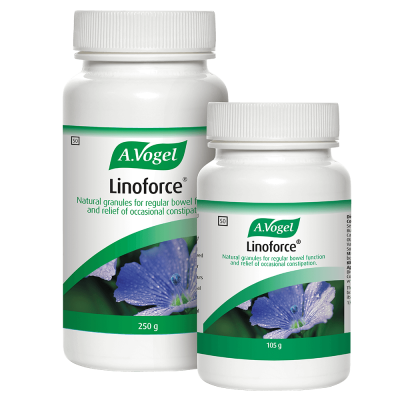
Linoforce®
Help maintain bowel comfort
- Helps maintain normal bowel regularity.
- 100% Natural.
- Botanical food supplement.
Linoforce® is made entirely from linseeds, senna and frangula and is one of Alfred Vogel’s very first remedies. Use Linoforce to help maintain normal bowel regularity and comfort.
Take 1 or 2 teaspoonfuls (5-10ml) as required sprinkled over your breakfast cereal or take with 200ml water. If required take a further 1 or 2 teaspoonfuls (5-10ml) in the evening with 200ml water.
Should not be taken long term unless directed by a healthcare professional.
Please seek medical advice if pregnant.
100g typically contains: Linseed 43.03g, Senna Leaves 12.91g, Frangula 1.07g, crystallised sucrose 12.05g, vanilla 0.02g, ginger essence 0.02g, excipients to 100g
Linseed, otherwise known as flaxseed, has many uses and is grown for its seeds and fibres. It originated from areas between Eastern Mediterranean and India. It was extensively cultivated by ancient cultures such as the Egyptians and Ethiopians.
Linseed’s versatility means that it is used for many things including paper and fabric making, dyes, soaps and hair gels.The oil is to be found in many wood finishing products as well as being a useful nutritional supplement.
The reason that these little linseeds are so useful in a product like Linoforce® is that it is rich in fibre. Furthermore the outside of the seed is coated with a natural film that absorbs moisture, creating a kind of ‘jelly’ making the coating of the linseeds slippery.
Senna, another ingredient in Linoforce, is native throughout the tropics. The leaves, like those used for making Linoforce, have played a major role in traditional healthcare. These were often prepared as infusions for a number of conditions. Nowadays senna leaves are used in herbal teas – particularly by those trying to lose weight.
Frangula, or alder buckthorn, grows in wet soil in open woods and hedgerows. It has played an important role in Greek Medicine and Galen, a Greek Physician in 2 A.D., credited Frangula and its close relatives with the ability to protect one from witches, demons, poisons and even headaches! Many years later, Frangula was found to be very useful in the manufacture of gun powder (no pun intended!).



